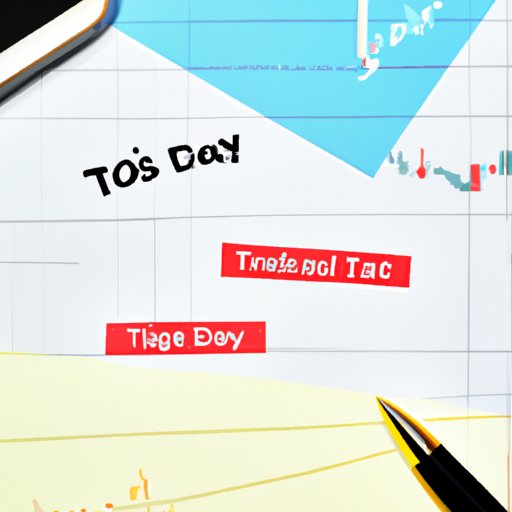
I. Introduction
Are you interested in trading stocks, currencies, or commodities? Day trading can be a lucrative and exciting way to make a living, but it requires a lot of knowledge, discipline, and practice.
This article will provide a comprehensive beginner’s guide on how to become a day trader. Whether you are a complete beginner or someone looking to improve your current trading skills, this guide will offer valuable insights and tips.
II. Starting with the Basics
Day trading involves buying and selling financial instruments, such as stocks, currencies, or commodities, within the same trading day. Anyone over 18 years of age can become a day trader, provided that they have the necessary capital to fund their trading account and meet their broker’s requirements.
However, before you start day trading, you need to have a good understanding of the market you will trade, broker fees, market regulations, and technical analysis tools. It is also essential to educate yourself on the basics of trading by reading books, attending seminars, or taking courses.
III. Establish a Trading Strategy
Establishing a trading strategy that aligns with your investment and financial goals is crucial to success in day trading. Your trading strategy should consider your risk tolerance, time horizon, and capital resources. You should also set clear entry and exit points for each trade, and use stop losses to limit your losses.
Some popular trading strategies include scalping, trend following, and mean reversion. As a novice day trader, you should try different techniques and strategies to find the one that suits your trading style.
IV. Managing Risk and Capital
Managing risk and capital effectively is critical to long-term success in day trading. You should establish money management rules that limit your risk and protect your capital. This includes preparing for losses, setting stop losses, and taking profits. Consider using risk-reward ratios, such as 2:1 or 3:1, to ensure that your potential reward outweighs your risk.
V. Conducting Research and Analysis
Conducting research and analysis is an essential part of day trading. You need to be able to read charts, recognize technical indicators, and understand market trends. There are many tools available to help you with this, such as market analysis platforms and financial news websites.
As a novice day trader, you should spend time studying the market you will trade. Keep up-to-date with market news and data, and track your trades to identify patterns and improve your trading strategy.
VI. Monitoring Market Activities
Monitoring market activities is crucial to success in day trading. You need to be able to track financial news and data, and quickly respond to market trends. Consider using market analysis platforms and real-time news feeds to stay updated with the latest market developments.
Monitoring market activities also involves setting up alerts for key events, such as earnings reports or central bank meetings, which could affect the market you are trading.
VII. Setting Realistic Goals and Expectations
Day trading requires patience, discipline, and a realistic mindset. You need to set achievable goals and avoid becoming fixated on overnight success. Remember that it takes years of experience to become a successful day trader.
Setting realistic goals includes identifying your strengths and weaknesses, tracking your progress over time, and adjusting your trading strategy as needed. You should also avoid unrealistic expectations and focus on long-term gains.
VIII. Learning from Experience
Learning from experience is a critical part of becoming a successful day trader. You should evaluate your trading performance regularly, keep a trading journal, and identify areas for improvement. This will help you refine your trading strategy and develop new skills.
Learning from experience also involves staying up-to-date with market developments and continually developing your knowledge and skills as a day trader.
IX. Conclusion
In conclusion, day trading can be a lucrative and exciting way to make a living, but it requires a lot of knowledge, discipline, and practice. To become a successful day trader, you need to start with the basics, establish a trading strategy, manage risk and capital, conduct research and analysis, monitor market activities, set realistic goals, and learn from experience.
We hope that this beginner’s guide has been helpful in providing valuable insights and tips on how to become a day trader. If you are interested in pursuing a career in day trading, start by educating yourself and putting what you learn into practice.
Remember, becoming a successful day trader takes time, effort, and perseverance. But with dedication and the right mindset, you can achieve your financial goals and enjoy the rewards of day trading.





